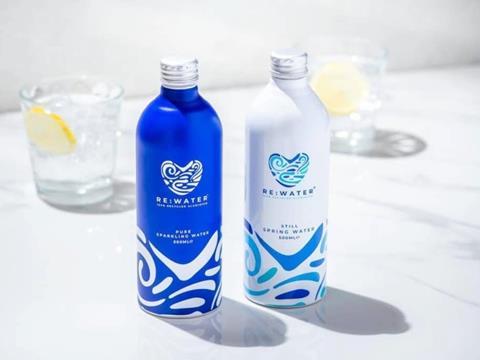
Aluminium bottled water brand Re:Water has announced a major five-year agreement with Ball, which will supply ‘tens of millions’ of bottles to support Re:Water’s growth in the retail, catering, and hospitality sectors.
The companies say the new contract extends their long-standing partnership and underlines Re:Water’s commitment to using 100% recycled aluminium and ensuring the product is locally sourced within the UK and Europe, minimizing its carbon footprint.
Re:Water states its bottles are designed to be refilled, reused, and endlessly recycled, aiming to offer a convenient premium alternative to single-use plastic, cartons and glass.
Victoria Marletta, commercial vice-president of Personal & Home Care at Ball Corporation, said: “Our purpose is clear: to unlock the infinite potential of aluminium to advance a world free from waste. What customers seek in today’s world is enduring value – solutions that are not only effective, but responsible. By listening to our customers and co-creating scalable solutions, we’re delivering aluminium innovations that reduce waste, lower emissions, and preserve product integrity.”
In November, Ball collaborated with Alcoa and Unilever to pilot the first use of Elysis carbon-free smelting technology in personal care and home care packaging, said to eliminate direct greenhouse gas emissions and generate oxygen in place of CO2. The technology is being utilized in an aerosol can made with 50% Elysis primary aluminium and 50% post-consumer recycled content.
The same month, cleaning brand Smol announced its new range of refillable bottles made from 100% recycled aluminium, aiming to reduce single-use plastic and unnecessary waste for customers. The bottles have been designed to work with the company’s existing pumps and triggers, helping to reduce unnecessary waste.
If you liked this story, you might also enjoy:
The ultimate guide to the Packaging and Packaging Waste Regulation in 2025
How are the top brands progressing on packaging sustainability?
Everything you need to know about global packaging sustainability regulation in 2025
The key to increasing the use of reusable packaging in supermarkets













No comments yet